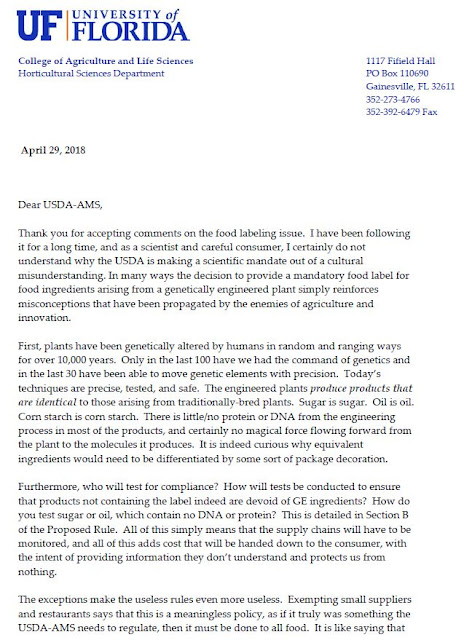My Letter to the USDA on "BE" Labels
The public comment period on the USDA's proposed "bioengineered" labels is history, at least your ability to respond to it. But as far as public comments go, the slate does not disappoint. As usual, the well informed decided not to share their knowledge, but every person with an opinion and no grasp of science was happy to chime in.
The Federal Register collected 2,446 comments.
The dominant take-home is that people have no clue about the science. When they do have a clue, they agree that the USDA AMS made a huge mistake by floating happy symbols with the term "B.E." for "bioengineered" a term nobody understands or ever used.
I did find my letter, and can say with certainty that I agree with myself from April 2018. I think its a neat letter.
The Federal Register collected 2,446 comments.
The dominant take-home is that people have no clue about the science. When they do have a clue, they agree that the USDA AMS made a huge mistake by floating happy symbols with the term "B.E." for "bioengineered" a term nobody understands or ever used.
I did find my letter, and can say with certainty that I agree with myself from April 2018. I think its a neat letter.
My letter to the USDA AMS about "Bioengineered" labels. In 20 years we'll have to get together and agree that I was correct.
For those of you that don't want to read the whole thing, here are some of the sentences that made me smile three months later:
"I certainly do not understand why the USDA is
making a scientific mandate out of a cultural misunderstanding."
"It is indeed curious why equivalent ingredients
would need to be differentiated by some sort of package decoration."
"All of this simply means that the supply chains
will have to be monitored, and all of this adds cost that will be handed down
to the consumer, with the intent of providing information they don’t understand
and protects us from nothing. "
" (Voluntary labeling) eliminates government from the process of
devising new rules that raise prices and produce new policy that has zero
effect on human health or welfare."
Wowzers! Three months after I wrote the letter it still makes me laugh. When you compare my thoughts to the 2440 other statements, it shows something important-- when we are scientifically illiterate we are prone to live in fear of non-issues, and are subject to being taken advantage of by bad people with horrible motivations.
And it is a reminder that the processes that dictate policy should rely on evidence, and not ask the public for their two cents. You can't buy anything good with that.



